Nursing Reflection: Clinical Experience, Nursing Report, Semester 1
VerifiedAdded on 2023/04/11
|8
|1658
|398
Report
AI Summary
This report is a nursing student's reflective journal based on a clinical experience, focusing on teamwork and leadership within a nursing unit. The student utilizes Gibb's reflective cycle to analyze an incident involving workplace conflict, poor leadership, and outdated nursing practices. The reflection covers the description of the event, the student's feelings, evaluation of the situation, analysis of the issues, and the conclusions drawn. The student identifies both positive and negative aspects of the experience, including lessons learned about conflict management, teamwork, and the importance of good leadership. The report concludes with an action plan outlining strategies for improved future experiences, emphasizing the need for affiliative, servant, and situational leadership styles. The student highlights the impact of nursing leadership on work environment, performance, and the well-being of nursing employees, emphasizing the importance of applying learned theories to future career development.
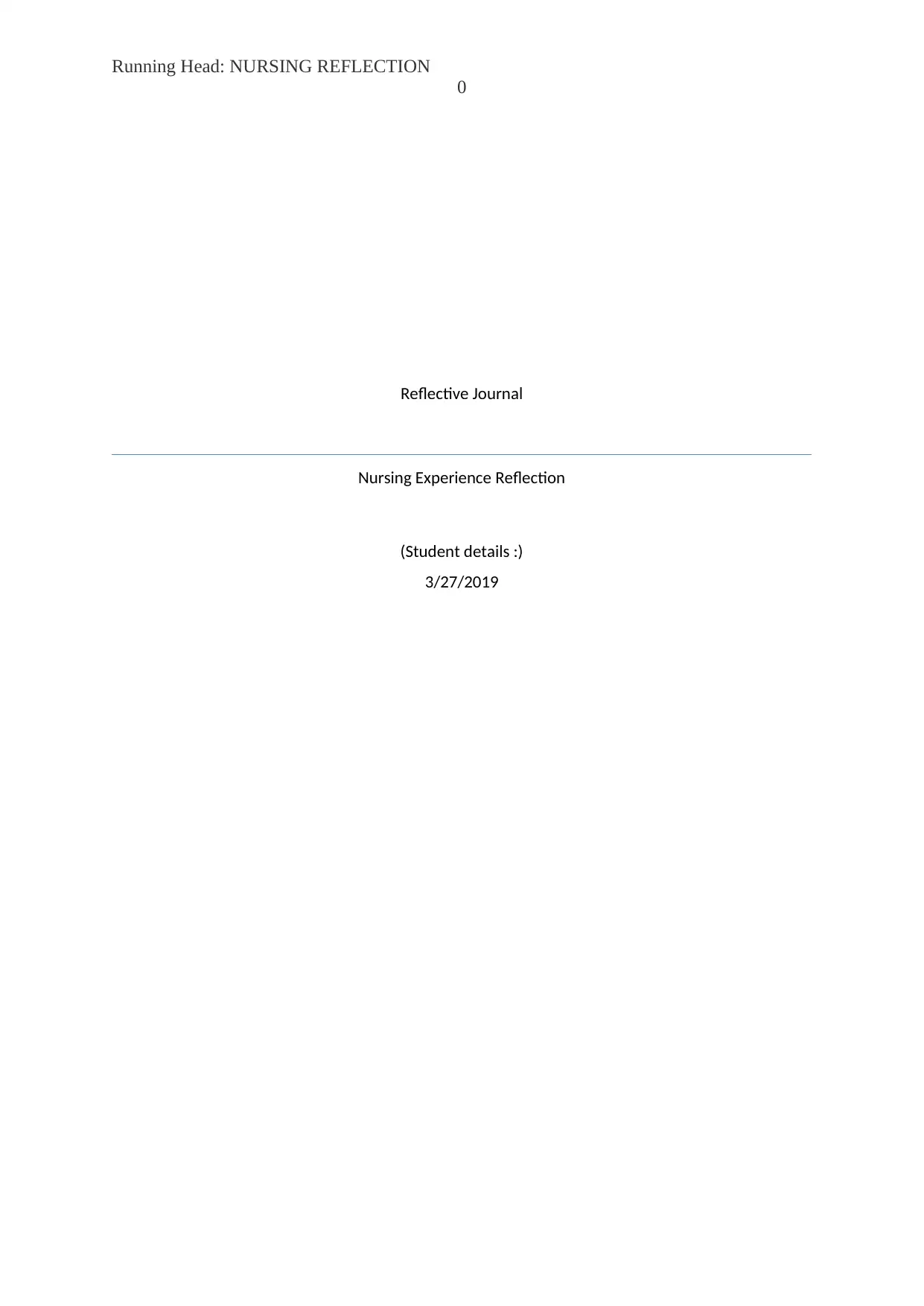
Running Head: NURSING REFLECTION
0
Reflective Journal
Nursing Experience Reflection
(Student details :)
3/27/2019
0
Reflective Journal
Nursing Experience Reflection
(Student details :)
3/27/2019
Paraphrase This Document
Need a fresh take? Get an instant paraphrase of this document with our AI Paraphraser
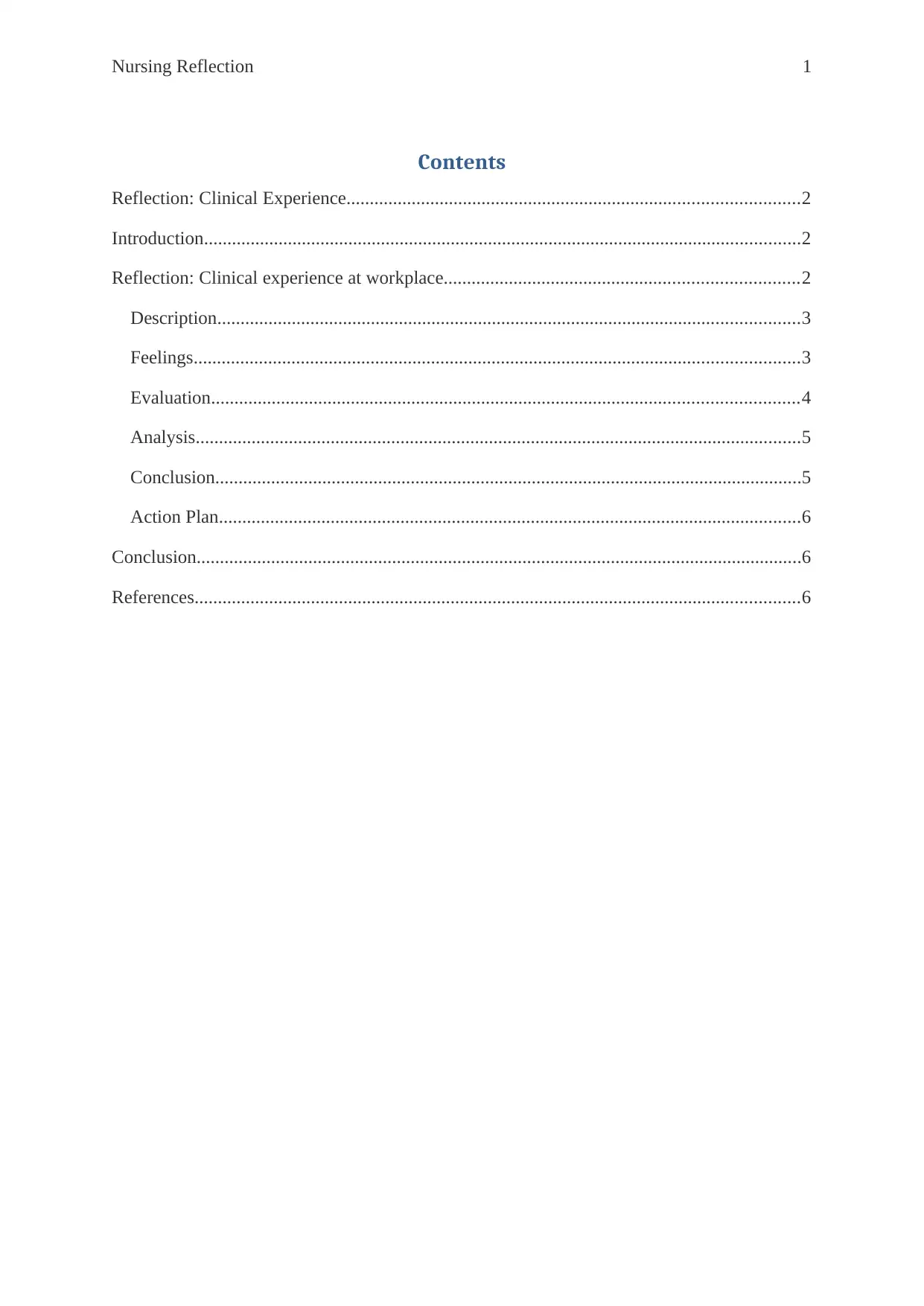
Nursing Reflection 1
Contents
Reflection: Clinical Experience.................................................................................................2
Introduction................................................................................................................................2
Reflection: Clinical experience at workplace............................................................................2
Description.............................................................................................................................3
Feelings..................................................................................................................................3
Evaluation..............................................................................................................................4
Analysis..................................................................................................................................5
Conclusion..............................................................................................................................5
Action Plan.............................................................................................................................6
Conclusion..................................................................................................................................6
References..................................................................................................................................6
Contents
Reflection: Clinical Experience.................................................................................................2
Introduction................................................................................................................................2
Reflection: Clinical experience at workplace............................................................................2
Description.............................................................................................................................3
Feelings..................................................................................................................................3
Evaluation..............................................................................................................................4
Analysis..................................................................................................................................5
Conclusion..............................................................................................................................5
Action Plan.............................................................................................................................6
Conclusion..................................................................................................................................6
References..................................................................................................................................6
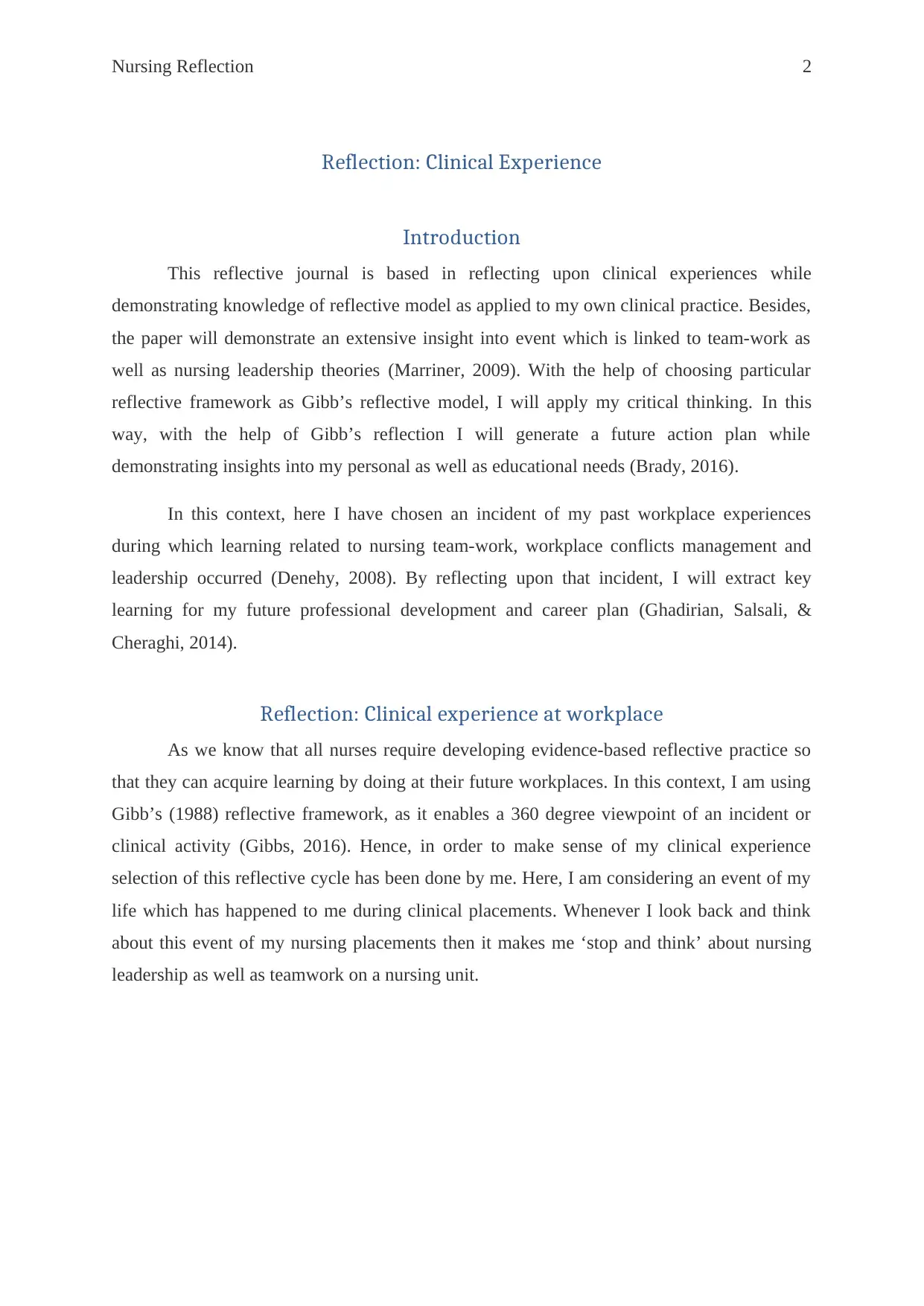
Nursing Reflection 2
Reflection: Clinical Experience
Introduction
This reflective journal is based in reflecting upon clinical experiences while
demonstrating knowledge of reflective model as applied to my own clinical practice. Besides,
the paper will demonstrate an extensive insight into event which is linked to team-work as
well as nursing leadership theories (Marriner, 2009). With the help of choosing particular
reflective framework as Gibb’s reflective model, I will apply my critical thinking. In this
way, with the help of Gibb’s reflection I will generate a future action plan while
demonstrating insights into my personal as well as educational needs (Brady, 2016).
In this context, here I have chosen an incident of my past workplace experiences
during which learning related to nursing team-work, workplace conflicts management and
leadership occurred (Denehy, 2008). By reflecting upon that incident, I will extract key
learning for my future professional development and career plan (Ghadirian, Salsali, &
Cheraghi, 2014).
Reflection: Clinical experience at workplace
As we know that all nurses require developing evidence-based reflective practice so
that they can acquire learning by doing at their future workplaces. In this context, I am using
Gibb’s (1988) reflective framework, as it enables a 360 degree viewpoint of an incident or
clinical activity (Gibbs, 2016). Hence, in order to make sense of my clinical experience
selection of this reflective cycle has been done by me. Here, I am considering an event of my
life which has happened to me during clinical placements. Whenever I look back and think
about this event of my nursing placements then it makes me ‘stop and think’ about nursing
leadership as well as teamwork on a nursing unit.
Reflection: Clinical Experience
Introduction
This reflective journal is based in reflecting upon clinical experiences while
demonstrating knowledge of reflective model as applied to my own clinical practice. Besides,
the paper will demonstrate an extensive insight into event which is linked to team-work as
well as nursing leadership theories (Marriner, 2009). With the help of choosing particular
reflective framework as Gibb’s reflective model, I will apply my critical thinking. In this
way, with the help of Gibb’s reflection I will generate a future action plan while
demonstrating insights into my personal as well as educational needs (Brady, 2016).
In this context, here I have chosen an incident of my past workplace experiences
during which learning related to nursing team-work, workplace conflicts management and
leadership occurred (Denehy, 2008). By reflecting upon that incident, I will extract key
learning for my future professional development and career plan (Ghadirian, Salsali, &
Cheraghi, 2014).
Reflection: Clinical experience at workplace
As we know that all nurses require developing evidence-based reflective practice so
that they can acquire learning by doing at their future workplaces. In this context, I am using
Gibb’s (1988) reflective framework, as it enables a 360 degree viewpoint of an incident or
clinical activity (Gibbs, 2016). Hence, in order to make sense of my clinical experience
selection of this reflective cycle has been done by me. Here, I am considering an event of my
life which has happened to me during clinical placements. Whenever I look back and think
about this event of my nursing placements then it makes me ‘stop and think’ about nursing
leadership as well as teamwork on a nursing unit.
⊘ This is a preview!⊘
Do you want full access?
Subscribe today to unlock all pages.

Trusted by 1+ million students worldwide
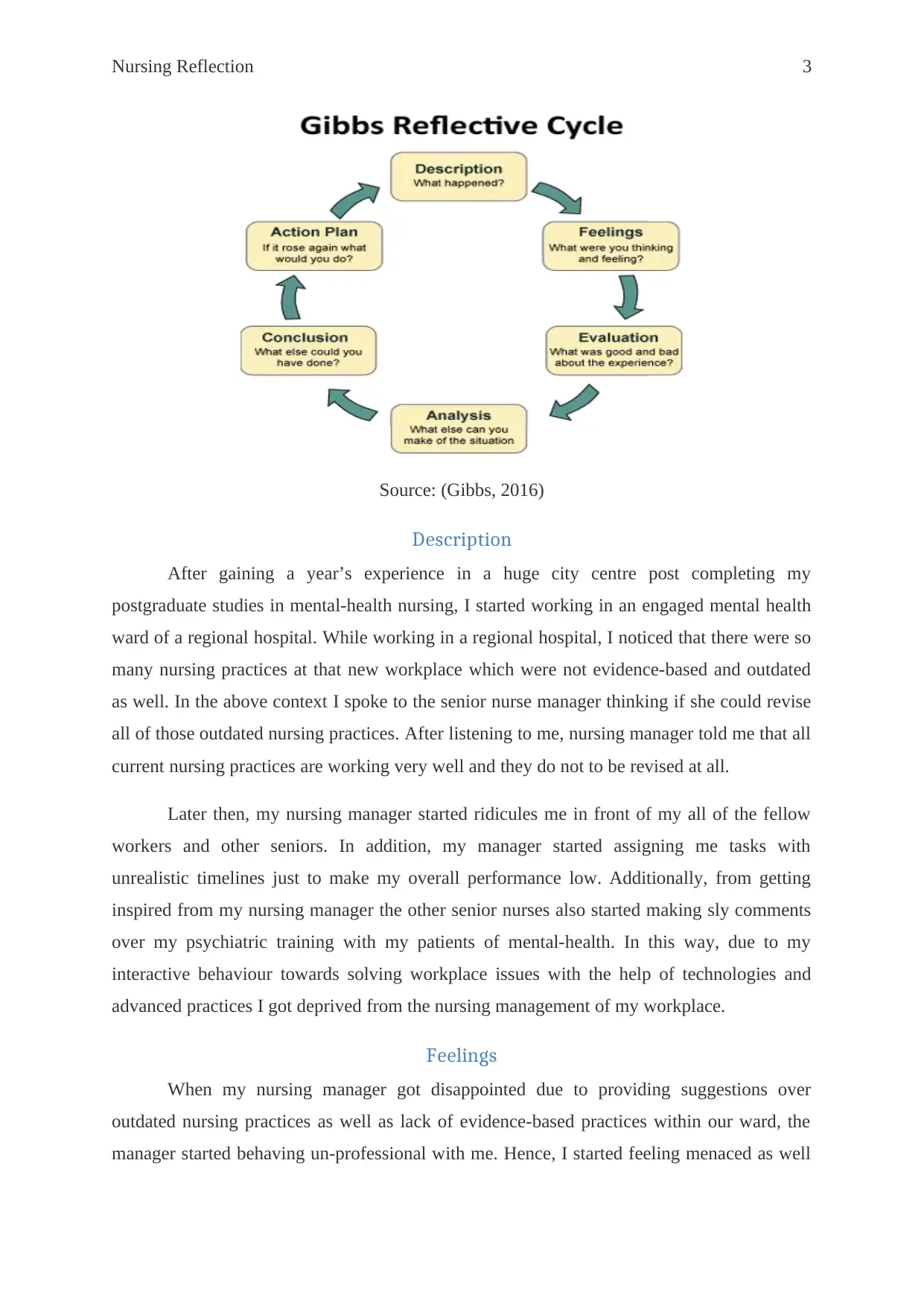
Nursing Reflection 3
Source: (Gibbs, 2016)
Description
After gaining a year’s experience in a huge city centre post completing my
postgraduate studies in mental-health nursing, I started working in an engaged mental health
ward of a regional hospital. While working in a regional hospital, I noticed that there were so
many nursing practices at that new workplace which were not evidence-based and outdated
as well. In the above context I spoke to the senior nurse manager thinking if she could revise
all of those outdated nursing practices. After listening to me, nursing manager told me that all
current nursing practices are working very well and they do not to be revised at all.
Later then, my nursing manager started ridicules me in front of my all of the fellow
workers and other seniors. In addition, my manager started assigning me tasks with
unrealistic timelines just to make my overall performance low. Additionally, from getting
inspired from my nursing manager the other senior nurses also started making sly comments
over my psychiatric training with my patients of mental-health. In this way, due to my
interactive behaviour towards solving workplace issues with the help of technologies and
advanced practices I got deprived from the nursing management of my workplace.
Feelings
When my nursing manager got disappointed due to providing suggestions over
outdated nursing practices as well as lack of evidence-based practices within our ward, the
manager started behaving un-professional with me. Hence, I started feeling menaced as well
Source: (Gibbs, 2016)
Description
After gaining a year’s experience in a huge city centre post completing my
postgraduate studies in mental-health nursing, I started working in an engaged mental health
ward of a regional hospital. While working in a regional hospital, I noticed that there were so
many nursing practices at that new workplace which were not evidence-based and outdated
as well. In the above context I spoke to the senior nurse manager thinking if she could revise
all of those outdated nursing practices. After listening to me, nursing manager told me that all
current nursing practices are working very well and they do not to be revised at all.
Later then, my nursing manager started ridicules me in front of my all of the fellow
workers and other seniors. In addition, my manager started assigning me tasks with
unrealistic timelines just to make my overall performance low. Additionally, from getting
inspired from my nursing manager the other senior nurses also started making sly comments
over my psychiatric training with my patients of mental-health. In this way, due to my
interactive behaviour towards solving workplace issues with the help of technologies and
advanced practices I got deprived from the nursing management of my workplace.
Feelings
When my nursing manager got disappointed due to providing suggestions over
outdated nursing practices as well as lack of evidence-based practices within our ward, the
manager started behaving un-professional with me. Hence, I started feeling menaced as well
Paraphrase This Document
Need a fresh take? Get an instant paraphrase of this document with our AI Paraphraser
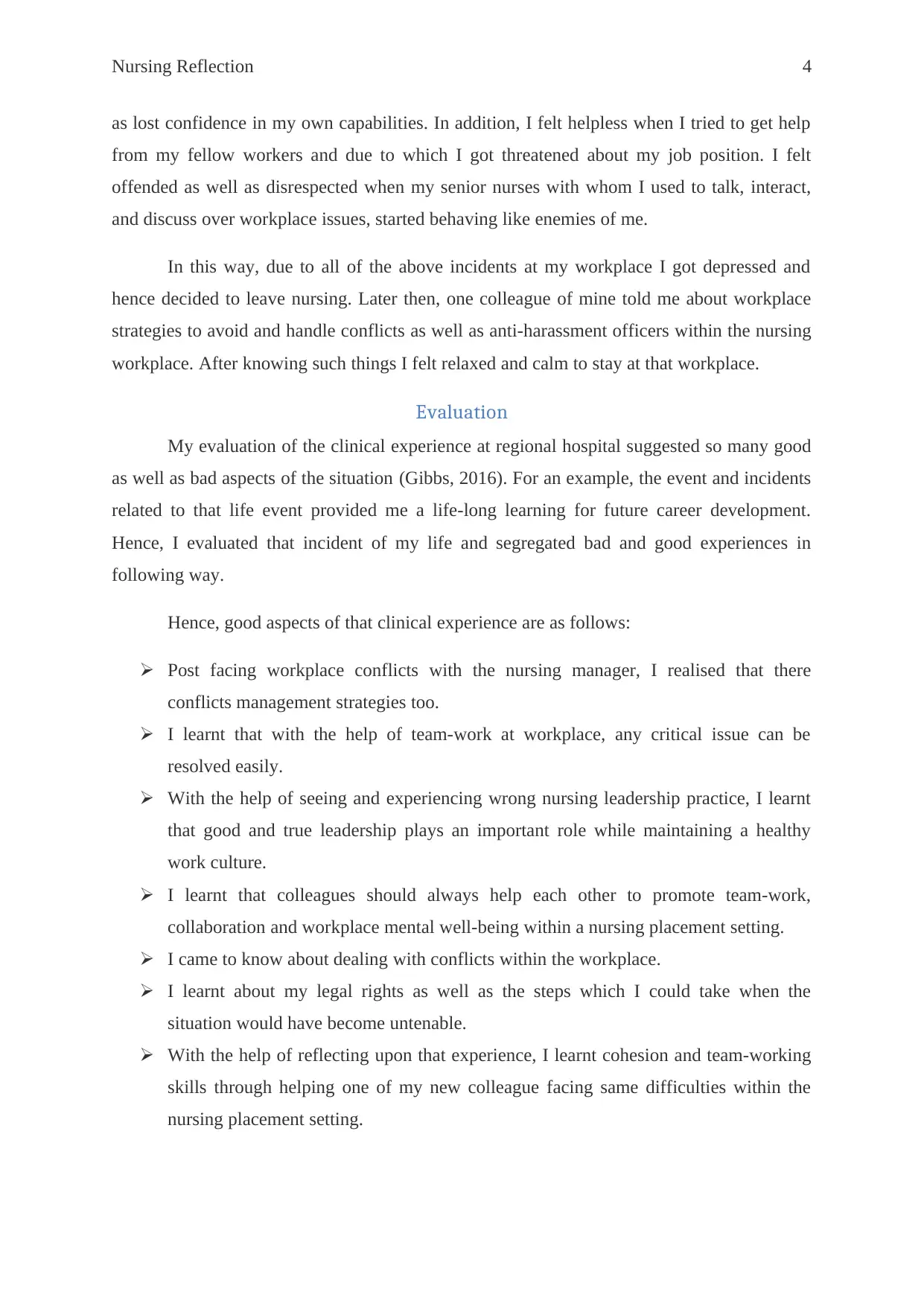
Nursing Reflection 4
as lost confidence in my own capabilities. In addition, I felt helpless when I tried to get help
from my fellow workers and due to which I got threatened about my job position. I felt
offended as well as disrespected when my senior nurses with whom I used to talk, interact,
and discuss over workplace issues, started behaving like enemies of me.
In this way, due to all of the above incidents at my workplace I got depressed and
hence decided to leave nursing. Later then, one colleague of mine told me about workplace
strategies to avoid and handle conflicts as well as anti-harassment officers within the nursing
workplace. After knowing such things I felt relaxed and calm to stay at that workplace.
Evaluation
My evaluation of the clinical experience at regional hospital suggested so many good
as well as bad aspects of the situation (Gibbs, 2016). For an example, the event and incidents
related to that life event provided me a life-long learning for future career development.
Hence, I evaluated that incident of my life and segregated bad and good experiences in
following way.
Hence, good aspects of that clinical experience are as follows:
Post facing workplace conflicts with the nursing manager, I realised that there
conflicts management strategies too.
I learnt that with the help of team-work at workplace, any critical issue can be
resolved easily.
With the help of seeing and experiencing wrong nursing leadership practice, I learnt
that good and true leadership plays an important role while maintaining a healthy
work culture.
I learnt that colleagues should always help each other to promote team-work,
collaboration and workplace mental well-being within a nursing placement setting.
I came to know about dealing with conflicts within the workplace.
I learnt about my legal rights as well as the steps which I could take when the
situation would have become untenable.
With the help of reflecting upon that experience, I learnt cohesion and team-working
skills through helping one of my new colleague facing same difficulties within the
nursing placement setting.
as lost confidence in my own capabilities. In addition, I felt helpless when I tried to get help
from my fellow workers and due to which I got threatened about my job position. I felt
offended as well as disrespected when my senior nurses with whom I used to talk, interact,
and discuss over workplace issues, started behaving like enemies of me.
In this way, due to all of the above incidents at my workplace I got depressed and
hence decided to leave nursing. Later then, one colleague of mine told me about workplace
strategies to avoid and handle conflicts as well as anti-harassment officers within the nursing
workplace. After knowing such things I felt relaxed and calm to stay at that workplace.
Evaluation
My evaluation of the clinical experience at regional hospital suggested so many good
as well as bad aspects of the situation (Gibbs, 2016). For an example, the event and incidents
related to that life event provided me a life-long learning for future career development.
Hence, I evaluated that incident of my life and segregated bad and good experiences in
following way.
Hence, good aspects of that clinical experience are as follows:
Post facing workplace conflicts with the nursing manager, I realised that there
conflicts management strategies too.
I learnt that with the help of team-work at workplace, any critical issue can be
resolved easily.
With the help of seeing and experiencing wrong nursing leadership practice, I learnt
that good and true leadership plays an important role while maintaining a healthy
work culture.
I learnt that colleagues should always help each other to promote team-work,
collaboration and workplace mental well-being within a nursing placement setting.
I came to know about dealing with conflicts within the workplace.
I learnt about my legal rights as well as the steps which I could take when the
situation would have become untenable.
With the help of reflecting upon that experience, I learnt cohesion and team-working
skills through helping one of my new colleague facing same difficulties within the
nursing placement setting.
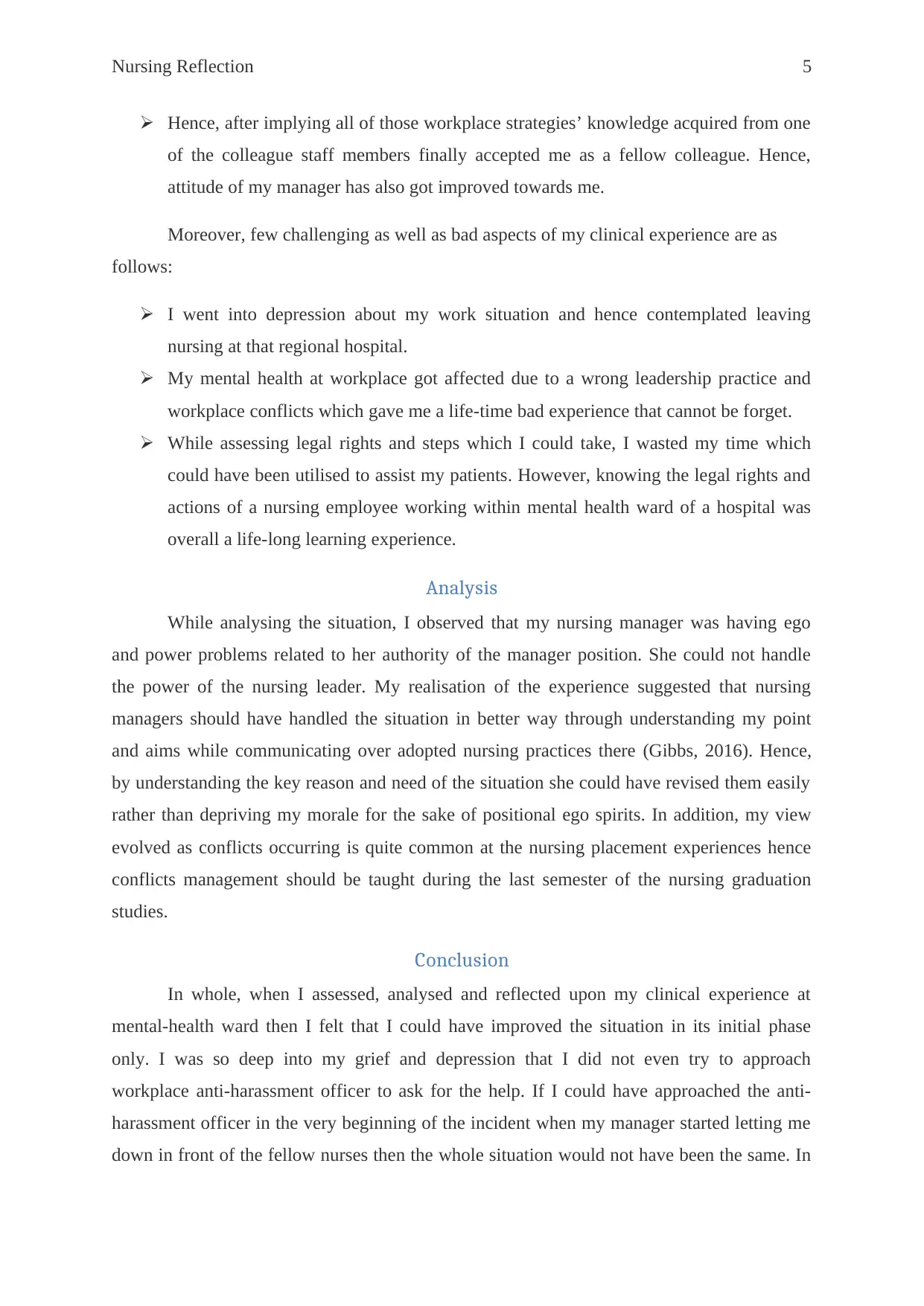
Nursing Reflection 5
Hence, after implying all of those workplace strategies’ knowledge acquired from one
of the colleague staff members finally accepted me as a fellow colleague. Hence,
attitude of my manager has also got improved towards me.
Moreover, few challenging as well as bad aspects of my clinical experience are as
follows:
I went into depression about my work situation and hence contemplated leaving
nursing at that regional hospital.
My mental health at workplace got affected due to a wrong leadership practice and
workplace conflicts which gave me a life-time bad experience that cannot be forget.
While assessing legal rights and steps which I could take, I wasted my time which
could have been utilised to assist my patients. However, knowing the legal rights and
actions of a nursing employee working within mental health ward of a hospital was
overall a life-long learning experience.
Analysis
While analysing the situation, I observed that my nursing manager was having ego
and power problems related to her authority of the manager position. She could not handle
the power of the nursing leader. My realisation of the experience suggested that nursing
managers should have handled the situation in better way through understanding my point
and aims while communicating over adopted nursing practices there (Gibbs, 2016). Hence,
by understanding the key reason and need of the situation she could have revised them easily
rather than depriving my morale for the sake of positional ego spirits. In addition, my view
evolved as conflicts occurring is quite common at the nursing placement experiences hence
conflicts management should be taught during the last semester of the nursing graduation
studies.
Conclusion
In whole, when I assessed, analysed and reflected upon my clinical experience at
mental-health ward then I felt that I could have improved the situation in its initial phase
only. I was so deep into my grief and depression that I did not even try to approach
workplace anti-harassment officer to ask for the help. If I could have approached the anti-
harassment officer in the very beginning of the incident when my manager started letting me
down in front of the fellow nurses then the whole situation would not have been the same. In
Hence, after implying all of those workplace strategies’ knowledge acquired from one
of the colleague staff members finally accepted me as a fellow colleague. Hence,
attitude of my manager has also got improved towards me.
Moreover, few challenging as well as bad aspects of my clinical experience are as
follows:
I went into depression about my work situation and hence contemplated leaving
nursing at that regional hospital.
My mental health at workplace got affected due to a wrong leadership practice and
workplace conflicts which gave me a life-time bad experience that cannot be forget.
While assessing legal rights and steps which I could take, I wasted my time which
could have been utilised to assist my patients. However, knowing the legal rights and
actions of a nursing employee working within mental health ward of a hospital was
overall a life-long learning experience.
Analysis
While analysing the situation, I observed that my nursing manager was having ego
and power problems related to her authority of the manager position. She could not handle
the power of the nursing leader. My realisation of the experience suggested that nursing
managers should have handled the situation in better way through understanding my point
and aims while communicating over adopted nursing practices there (Gibbs, 2016). Hence,
by understanding the key reason and need of the situation she could have revised them easily
rather than depriving my morale for the sake of positional ego spirits. In addition, my view
evolved as conflicts occurring is quite common at the nursing placement experiences hence
conflicts management should be taught during the last semester of the nursing graduation
studies.
Conclusion
In whole, when I assessed, analysed and reflected upon my clinical experience at
mental-health ward then I felt that I could have improved the situation in its initial phase
only. I was so deep into my grief and depression that I did not even try to approach
workplace anti-harassment officer to ask for the help. If I could have approached the anti-
harassment officer in the very beginning of the incident when my manager started letting me
down in front of the fellow nurses then the whole situation would not have been the same. In
⊘ This is a preview!⊘
Do you want full access?
Subscribe today to unlock all pages.

Trusted by 1+ million students worldwide
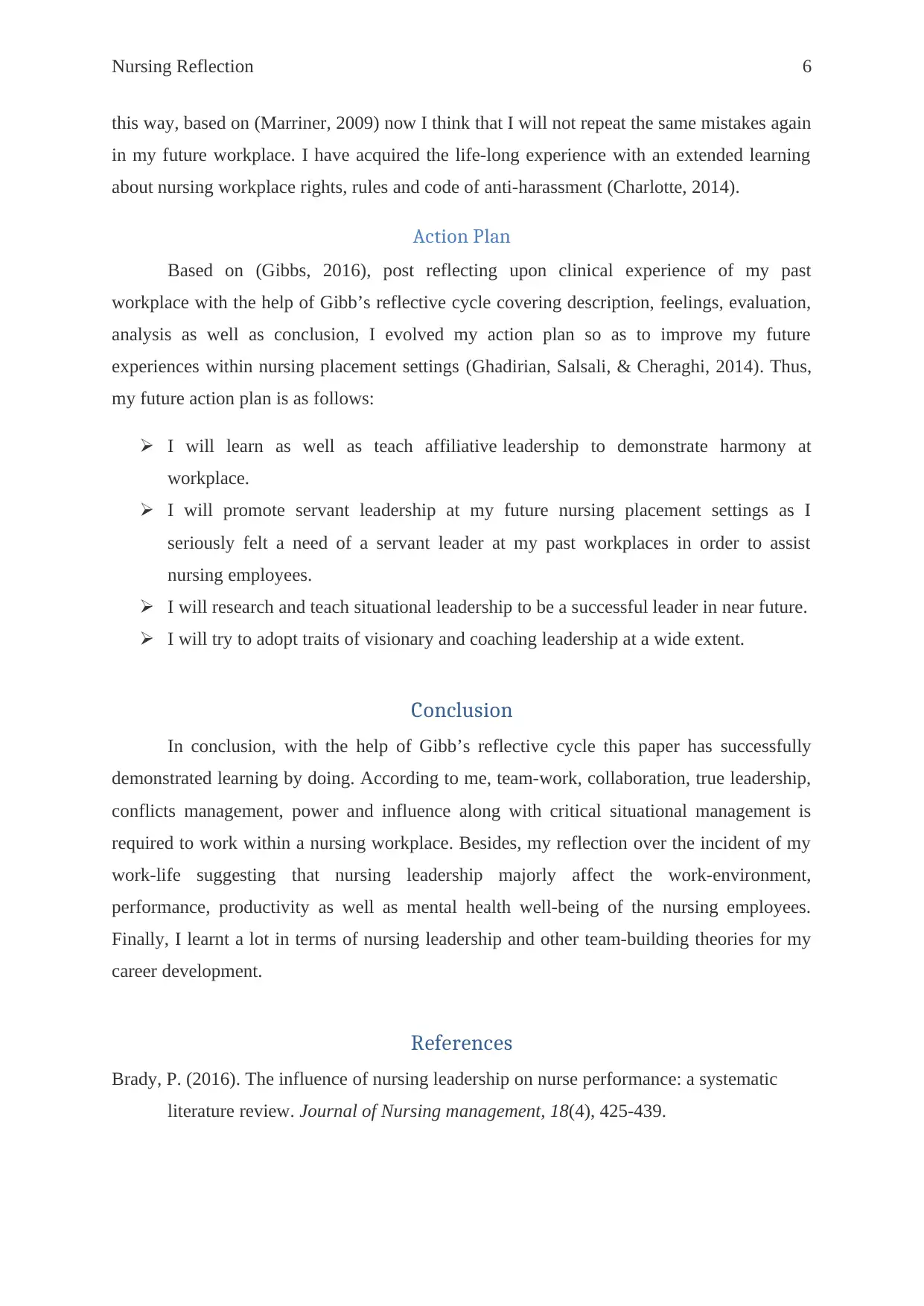
Nursing Reflection 6
this way, based on (Marriner, 2009) now I think that I will not repeat the same mistakes again
in my future workplace. I have acquired the life-long experience with an extended learning
about nursing workplace rights, rules and code of anti-harassment (Charlotte, 2014).
Action Plan
Based on (Gibbs, 2016), post reflecting upon clinical experience of my past
workplace with the help of Gibb’s reflective cycle covering description, feelings, evaluation,
analysis as well as conclusion, I evolved my action plan so as to improve my future
experiences within nursing placement settings (Ghadirian, Salsali, & Cheraghi, 2014). Thus,
my future action plan is as follows:
I will learn as well as teach affiliative leadership to demonstrate harmony at
workplace.
I will promote servant leadership at my future nursing placement settings as I
seriously felt a need of a servant leader at my past workplaces in order to assist
nursing employees.
I will research and teach situational leadership to be a successful leader in near future.
I will try to adopt traits of visionary and coaching leadership at a wide extent.
Conclusion
In conclusion, with the help of Gibb’s reflective cycle this paper has successfully
demonstrated learning by doing. According to me, team-work, collaboration, true leadership,
conflicts management, power and influence along with critical situational management is
required to work within a nursing workplace. Besides, my reflection over the incident of my
work-life suggesting that nursing leadership majorly affect the work-environment,
performance, productivity as well as mental health well-being of the nursing employees.
Finally, I learnt a lot in terms of nursing leadership and other team-building theories for my
career development.
References
Brady, P. (2016). The influence of nursing leadership on nurse performance: a systematic
literature review. Journal of Nursing management, 18(4), 425-439.
this way, based on (Marriner, 2009) now I think that I will not repeat the same mistakes again
in my future workplace. I have acquired the life-long experience with an extended learning
about nursing workplace rights, rules and code of anti-harassment (Charlotte, 2014).
Action Plan
Based on (Gibbs, 2016), post reflecting upon clinical experience of my past
workplace with the help of Gibb’s reflective cycle covering description, feelings, evaluation,
analysis as well as conclusion, I evolved my action plan so as to improve my future
experiences within nursing placement settings (Ghadirian, Salsali, & Cheraghi, 2014). Thus,
my future action plan is as follows:
I will learn as well as teach affiliative leadership to demonstrate harmony at
workplace.
I will promote servant leadership at my future nursing placement settings as I
seriously felt a need of a servant leader at my past workplaces in order to assist
nursing employees.
I will research and teach situational leadership to be a successful leader in near future.
I will try to adopt traits of visionary and coaching leadership at a wide extent.
Conclusion
In conclusion, with the help of Gibb’s reflective cycle this paper has successfully
demonstrated learning by doing. According to me, team-work, collaboration, true leadership,
conflicts management, power and influence along with critical situational management is
required to work within a nursing workplace. Besides, my reflection over the incident of my
work-life suggesting that nursing leadership majorly affect the work-environment,
performance, productivity as well as mental health well-being of the nursing employees.
Finally, I learnt a lot in terms of nursing leadership and other team-building theories for my
career development.
References
Brady, P. (2016). The influence of nursing leadership on nurse performance: a systematic
literature review. Journal of Nursing management, 18(4), 425-439.
Paraphrase This Document
Need a fresh take? Get an instant paraphrase of this document with our AI Paraphraser
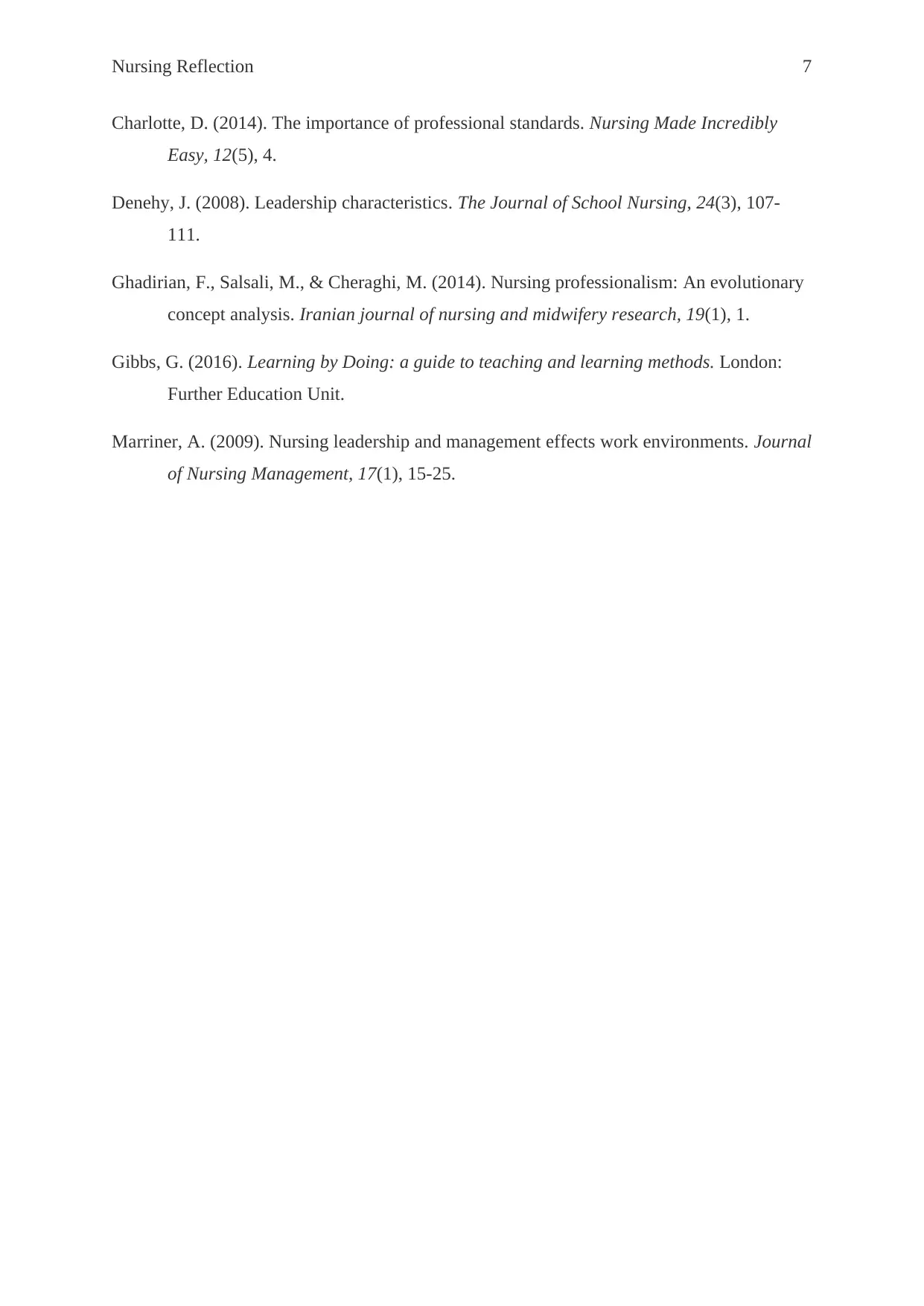
Nursing Reflection 7
Charlotte, D. (2014). The importance of professional standards. Nursing Made Incredibly
Easy, 12(5), 4.
Denehy, J. (2008). Leadership characteristics. The Journal of School Nursing, 24(3), 107-
111.
Ghadirian, F., Salsali, M., & Cheraghi, M. (2014). Nursing professionalism: An evolutionary
concept analysis. Iranian journal of nursing and midwifery research, 19(1), 1.
Gibbs, G. (2016). Learning by Doing: a guide to teaching and learning methods. London:
Further Education Unit.
Marriner, A. (2009). Nursing leadership and management effects work environments. Journal
of Nursing Management, 17(1), 15-25.
Charlotte, D. (2014). The importance of professional standards. Nursing Made Incredibly
Easy, 12(5), 4.
Denehy, J. (2008). Leadership characteristics. The Journal of School Nursing, 24(3), 107-
111.
Ghadirian, F., Salsali, M., & Cheraghi, M. (2014). Nursing professionalism: An evolutionary
concept analysis. Iranian journal of nursing and midwifery research, 19(1), 1.
Gibbs, G. (2016). Learning by Doing: a guide to teaching and learning methods. London:
Further Education Unit.
Marriner, A. (2009). Nursing leadership and management effects work environments. Journal
of Nursing Management, 17(1), 15-25.
1 out of 8
Related Documents
Your All-in-One AI-Powered Toolkit for Academic Success.
+13062052269
info@desklib.com
Available 24*7 on WhatsApp / Email
![[object Object]](/_next/static/media/star-bottom.7253800d.svg)
Unlock your academic potential
Copyright © 2020–2026 A2Z Services. All Rights Reserved. Developed and managed by ZUCOL.





